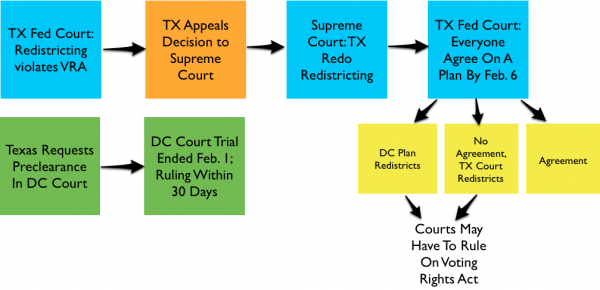A Visual Guide: Where Texas Redistricting Goes From Here
By now most of you are frustrated by the goings on in the Texas Redistricting Telenovela and I don’t blame you. Although it’s frustrating to me to keep retelling the story behind the story, I am getting better at uncovering all the subtexts and retelling the story. Basically, there is now only one issue: the Republican Party is trying to maximize the number of seats they control in the Texas House and Congress by manipulating the number of Latino and African American voters in certain districts. This resulted in a lawsuit brought by Latino and African American plaintiffs in San Antonio in October under Section 2 of the Voting Rights Act.
Regardless of how this court ruled, however, the plan had to be “precleared” under Section 5 of the VRA by either the Justice Department or the DC Federal District Court. So, while the trial in San Antonio was in process, Texas decided to seek preclearance in the DC Court. The Texas Attorney General, who acts as the state’s lawyer in these matters, chose this court because, according two an email from Congressman Lamar Smith R-TX, the Republican-dominated court would tend to be more favorable to the state even if the state had to appeal to the Supreme Court (SCOTUS).
So, there were two court actions, in two different courts, going on at almost the same time. Below is a chronology of what was going on, where it was going on and then I’ll give you my perspective of what I think is going to happen.
- The Texas Court (Federal Western District of Texas, three-judge panel headed by Judge Orlando Garcia in San Antonio) ruled that the original plans submitted by the state violated the VRA and needed to be redrawn.
- The State of Texas appealed this decision to the SCOTUS, which ruled that the Texas Court had been partially correct but didn’t rely enough on the state’s original plan in a couple of areas. So, SCOTUS asked the Texas Court to redo the process.
- In the meantime, the DC Circuit Court denied preclearance in the summary judgment stage so a full blown trial was convened at the request of Texas. This trial ended February 1 with closing arguments and the Court said they’d rule within 30 days.
- This means that the Texas Court is left with the task of taking the next step, which they are doing by insisting that all parties come together and produce an interim plan by Feb. 6 so elections can be held in April.
- If the two sides can’t come together and design an interim plan then the Texas Court has to decide whether to provide its own plan or wait to see what the DC Circuit Court decide.
- If the Texas Court decides to act, and do its own plan, then the Texas Attorney General will probably appeal again to SCOTUS for a decision.
- But if the Texas Court decides to rule it may have to make some important decision concerning the Voting Rights Act. If so, then SCOTUS will be placed in a position to make a monumental decision about the Act — something that opponents of the Act want very much, hoping that SCOTUS will declare Section 5 unconstitutional.
What is this all about really? If you’re confused now, I don’t blame you. Pero, what is going on is tactical lawyering by the Attorney General of Texas to create enough chaos that the entire matter falls into the lap of SCOTUS with the idea of obtaining the unconstitutional ruling to ease future manipulation of Latino votes. On one level the Republican Party wants an end to federal oversight of elections — they paint the VRA as federal intrusion in a state’s right. On another, without the VRA, states dominated by Republicans and Tea Partiers will openly deny the right to vote to Latinos well into the future.
Racism is alive and well in Texas and throughout the United States and the VRA is one of the few effective enforcement devices against racism in the election process. The Attorney General of Texas is not simply trying to do away with the VRA — he is trying to build his resume so he can be the next governor of the state. To think, letting the political ambitions of one person determine the constitutional rights of millions is not just ridiculous but a travesty of justice, but then no one has accused him of being a champion of justice recently.


